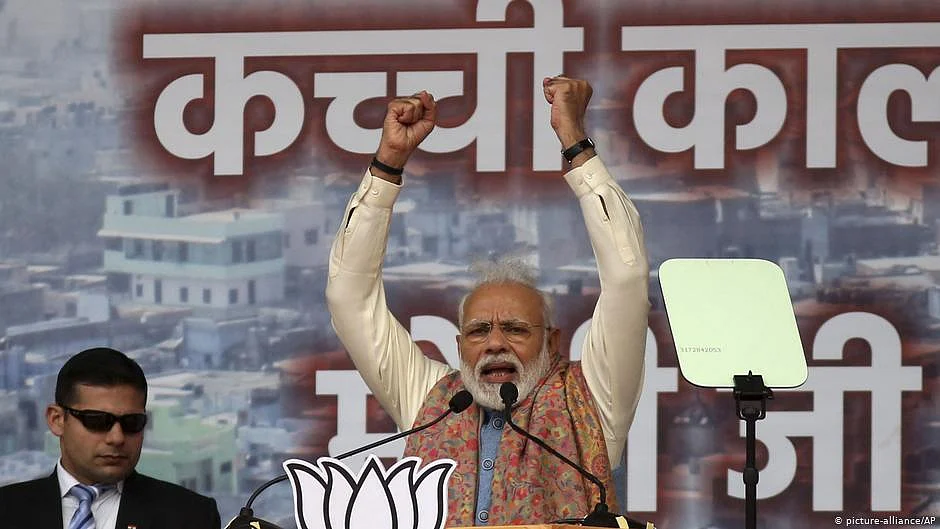Modi regime’s ‘double speak’ is exposed, students are fighting for Indian ethos
Prime Minister Narendra Modi, in his ‘Mann Ki Baat’, the last one for the year, said on a conciliatory note that ‘young’ today does not like lack of governance and instability

Prime Minister Narendra Modi, in his ‘Mann Ki Baat’, the last one for the year, said on a conciliatory note that ‘young’ today does not like lack of governance and instability. It was his way of veiling the fact that police was let loose to be brutal to any extent, in JNU, AMU, Jamia, many of the cities of UP and all over the country. The target was mostly the minorities, in their every age group. Even a three-year-old was not spared. Wounds would heal except those dealt on the psych. It is how ‘Untruth’ moves.
The protests, peaceful and unarmed, are unabated against NPR-NRC-CAA that poses a challenge against our Constitution, our composite culture. The battle continues unabated.
The regime, with all its brute force, stands against the common unarmed masses.
Amidst the mayhem, home minister Amit Shah has come out with a claim that the National Population Register (NPR) and the National Register for Citizens (NRC) have both been governed by different laws and NPR data would never be used for the NRC exercise.
Elaborating his point, he said, “NPR is the database on which policy is made. NRC is a process in which people are asked to prove their citizenship. There is no connection between the two.”
Despite the communal overtones in the entire initiative which goes against our Constitution, the home minister refuses to desist from his claim, though facts stand in contrast to his claims. The Citizenship Rules of 2003 under the Citizenship Act 1955, NPR is imperative for the rules framed for NRC.
And that is not all. It was the prime minister himself declaring, in 2014, in the Parliament at least nine times that without NPR data, NRC will not be conducted, since NCR was a ‘logical conclusion’ of the NPR.
So far as the law goes, NPR, an enumeration of “usual residents” (resident for at least six months) of the country, is a data-collection exercise based on voluntary disclosure of information by people and is governed by Citizenship (Registration of Citizens and Issue of National Identity Cards) Rules, 2003, that were framed under subsections (1) and (3) of Section 18 of the Citizenship Act, 1955.
Under Rule 3, which provides for NRC, sub-rule (4), says, “The Central Government may, by an order issued in this regard, decide a date by which the Population Register shall be prepared by collecting information relating to all persons who are usually residing within the jurisdiction of Local Registrar.”
As the home minister kept drumming on the same untruth, there was another spanner. Under Rule 4, titled “Preparation of the National Register of Indian Citizens”, sub-rule 4 says,
“During the verification process, particulars of such individuals, whose Citizenship is Edited, Printed & Published by Nitya Chakraborty on behalf of Panchsheel News Pvt. Ltd. at D-34, Gulmohar Park, New Delhi-110049 doubtful, shall be entered by the Local Registrar with appropriate remark in the Population Register for further enquiry and in case of doubtful citizenship, the individual or the family shall be informed in a specified proforma immediately after the verification process is over.”
Under the doubtful heading, those entered would be easily identified! It could be entire family, or one, identified as the possible ‘other’.
Sub-rule (5) of the Rule then says: “The Local Register of Indian citizens shall contain details of persons after due verification made from the Population Register.”
Under Rule 7, the head of the family is supposed to provide correct information to enumerators during NPR exercise failing which he shall be penalised (under rule q17) with a fine extending up to Rs 1,000.
The 2018-19 Annual Report of the MHA, says that NPR is the first step towards implementation of the NRC. “The National Population Register (NPR) is the first step towards the creation of the National Register of Indian Citizens (NRIC) under the provisions of the aforementioned Statute (Citizenship Act),” the Annual Report said.
In Parliament, former MoS Home Kiren Rijiju said, “The scheme of NPR has been reviewed and it has been decided that NPR should be completed and taken to its logical conclusion, which is creation of NRIC by verification of citizenship status of every usual resident in the NPR.”
On July 15 and July 22 again, Rijiju linked NPR and NRIC on similar lines during question hour in Lok Sabha. On July 23, he made the same statements in Rajya Sabha. On November 29, 2014, Rijiju told Rajya Sabha: “The NPR is the first step towards creation of National Register of Indian Citizens (NRIC) by verifying the citizenship status of every usual resident.” On April 21 and July 28, 2015, then MoS Home Haribhai Parthibhai Chaudhury reiterated the “logical conclusion” statement in Lok Sabha during question hour. On May 13, 2015, in Rajya Sabha, Rijiju made similar assertions.
On November 11, 2016, Rijiju reiterated this during question hour in Rajya Sabha. “The Government has approved the preparation of Population Register comprising details of usual residents in the country. The preparation of Population Register is a part of preparation of National Register of Indian Citizens under provisions of the Citizenship Act, 1955 read with the Citizenship Rules (2003).”
Yet again, in the same RSS-BJP led government, home minister Amit Shah, who has underlined several times that the NRC will be held, echoed prime minister Narendra Modi’s remarks that there has been no talk of NRC in the government.
Follow us on: Facebook, Twitter, Google News, Instagram
Join our official telegram channel (@nationalherald) and stay updated with the latest headlines